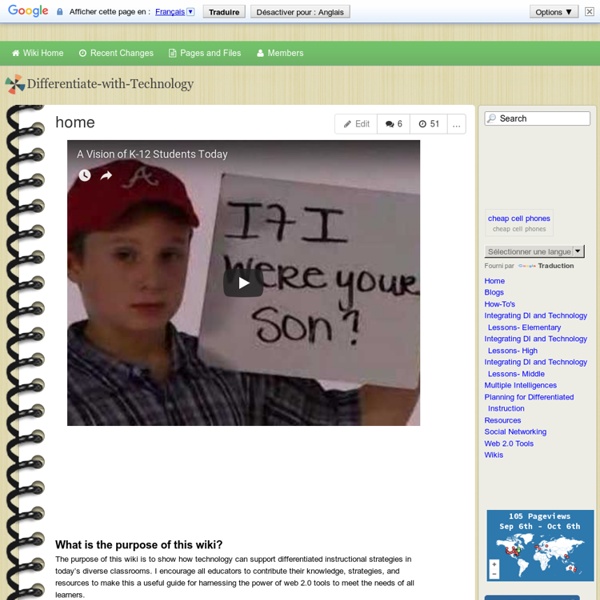



Tools for Differentiation / FrontPage Instructional Strategies Online "What children learn depends not only on what they are taught but also how they are taught, their development level, and their interests and experiences.... These beliefs require that much closer attention be paid to the methods chosen for presenting material..." Understanding the Common Essential Learnings, Saskatchewan Education, 1988. (p.10) "The last decades of research in human learning have presented new insights into the ways that learners are active in constructing their own understanding. Constructivist learning theories have shown the limitations of viewing 'learning' as something we can 'give' to students that they will 'receive' or learn in exactly the same form, at exactly the given time."
K-5 Instructional Technology Integration Resources - home Using Technology to Differentiate Instruction - TheApple.com Resources >> Browse Articles >> Utilizing Technology Featured Author: Mrs. Kelly Tenkely Kelly Tenkely is a technology teacher in a private school. One of the major benefits of using technology in the classroom is the ability to differentiate instruction to meet the needs of every student in every lesson. Below you will find website suggestions that address the different learning styles in your classroom with the help of technology: Verbal-Linguistic These learners enjoy learning through speaking, writing, reading, and listening. Websites to encourage learning for Verbal-Linguistic students: 1. Allow students to express themselves creatively with words 2. Capture student voices with audio, text, pictures, and video 3. A free online word processor, and presentation tool 4. Students can podcast (voice recording) online. 5. – Students can create stories or mini-movies Logical-Mathematical
dhinstructionaltechnology - home The Best Resources On Differentiating Instruction My colleague Katie Hull-Sypnieski is leading a February 1st Education Week Webinar on differentiating instruction, and I would strongly encourage people to participate. Katie’s the best teacher I’ve ever seen…. In addition, Katie and I have co-authored a piece for Education Week Teacher on the topic that will be appearing there soon (it’s appeared: The Five By Five Approach To Differentiation Success), and an upcoming post in my blog there will be talking about it, too (that two part series has also appeared). I also did a second two-part series in Ed Week on differentiation. Also, check out The Best “Fair Isn’t Equal” Visualizations. Given all that, a “The Best…” post was inevitable, and here it is. Here are my choices for The Best Resources On Differentiating Instruction: The Best Places To Get The “Same” Text Written For Different “Levels” Busting Myths about Differentiated Instruction is by Rick Wormeli. Reconcilable Differences? Deciding to Teach Them All is by Carol Ann Tomlinson.
Stephanie Sandifer - Transformative Technology Coaching Welcome to the homepage for Transformative Technology Coaching. Included here are resources and information designed to help individuals make the shift from delivering traditional ed tech support to facilitating powerful and engaging Transformative Technology Coaching. Move beyond "tech support" and delivering one-shot ed tech workshops to become a Transformative Technology Coach focused on facilitating embedded, ongoing professional learning for all. Learn why traditional tech integration strategies don't work, and explore strategies, resources, and tools for effective and efficient coaching for transformed professional practice. Participants will learn about specific strategies and solutions for effective instructional, cognitive, and peer coaching that lead to more reflective, student-centered, authentic, and engaging learning. Instructional Coaching "Instructional coaches are onsite professional developers who teach educators how to use proven teaching methods. Cognitive Coaching
Differentiation - tools, tips and resources Differentiation is an important aspect of education. Students learn differently, have different needs, different backgrounds, different skills, different ability levels, different interests and more. As educators, we try to create engaging lesson activities that provide a variety of learning experiences and allow students to demonstrate their learning in different ways. Differentiation should occur in both how students learn and gain knowledge and skills, and in how they demonstrate and are assessed on what they have learned. “In the practice of education, differentiation is defined as working to address the abilities, interests, and needs (both perceived and real) of individuals. Here are some resources, tips, and tools on differentiation: Digital Differentiation - ideas and tools for differentiating with digital resources Tools for Differentiation - helping teachers meet the needs of all learners Differentiating with Web 2.0 Technologies
Digital Differentiation Technology is a tool that can be used to help teachers facilitate learning experiences that address the diverse learning needs of all students and help them develop 21st Century Skills. At it's most basic level, digital tools can be used to help students find, understand and use information. When combined with student-driven learning experiences fueled by Essential Questions offering flexible learning paths, it can be the ticket to success. Here is a closer look at three components of effectively using technology as a tool for digital differentiation. Note: The interactive graphics you see below have been updated. They can be found in a newer post on this blog. The goal is to design student-driven learning experiences that are fueled by standards-based Essential Questions and facilitated by digital tools to provide students with flexible learning paths. Essential Questions: Student-driven learning experiences should be driven by standards-based Essential Questions.